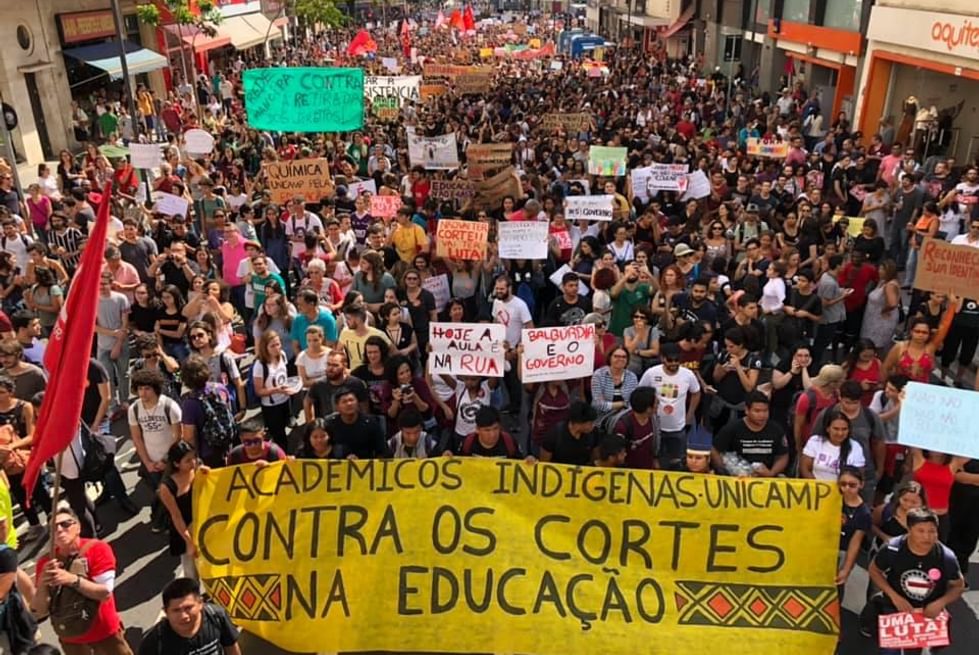Class Struggle Is a War of Worlds: Bolsonaro and the Disengaged Left
From the Series: Bolsonaro and the Unmaking of Brazil
From the Series: Bolsonaro and the Unmaking of Brazil

The Brazilian Left under Bolsonarism is in a paradoxical position. On the one hand, the existence of Bolsonaro’s government exposes the open wound of the Left, defeated in an attempt to accommodate neoliberalism. On the other hand, Bolsonaro elevates it to the position of antagonist, giving a new centrality to the Partido dos Trabalhadores (PT, Workers’ Party) and to Lula da Silva, arrested in April 2018.
In this way, Bolsonarism simultaneously overthrows and restores a depleted Left, which is now institutionally blocked after more than a decade in government and threatened by a corroded political system. Years of neoliberalism have thrown us into an even greater impasse. The Left turned into a left-to-rule: with a great appetite to rule, but without effective mechanisms to connect to the streets, with no common land.

By denouncing the decay of republican institutions, Bolsonarism robs the place of any potential radical rebellion and constrains the Left by testing the limits of the country’s democratic institutions. It also challenges the fragile constitutional pact of the 1980s, re-opening the agreement to forget regarding state crimes committed by the civic-military dictatorship in Brazil (1964–1985), questioning the democratic order born at that time. Meanwhile, the left believes the question is about making the poor “more aware” of the political reality of the country. Attempts to reenact a new left-wing populism and old election programs try to obscure the scandal that comes from the streets: many poor people voted for Bolsonaro.
In the current political context, the Left presents itself as the defender of the actual democracy, and strives to represent the democratic integrity of progressive politics by advocating a return to the past through the idea of national development and progress. Bolsonarism, at the same time, feeds off strong dissatisfactions, such as the 2018 truck driver strike that paralyzed the country, and goes so far as to present itself as the legitimate heir to the protest events of June 2013, which most of the institutional Left could only see with suspicion, as a threat.1
There were strong protests against Bolsonaro in May 2019, and again in August 2019, especially in response to cuts in the education budget. The government was attentive in November 2019 to the possibility of protests similar to what was seen in other countries in the region. Bolsonarism, however, still expresses part of the collective outrage at the political failures of the past, while the way to the streets is still closed for the Left.
The displacement of the Brazilian Left reverberates a widespread disillusionment with politicians and political institutions. The break with progressivist politics (a mark of the Latin American institutional Left) comes from the realization that its pillars were made of elements that have acquired monstrous power with Bolsonaro now in the presidency: the appeal to the idea of nation, the alliance with agribusiness as engines of progress and growth, the strategic electoral use of evangelical radicalism, and the deployment of the military as a pacification weapon in urban conflicts.
To engage in the war of worlds declared by Bolsonaro is to reject the hypothesis that Brazil is built upon monoculture, extractivism, and militarism. It is no coincidence that Bolsonaro declared war on the Amerindian peoples.2 His discourse depends on denying that there is enough diversity in Brazil to obviate his theater of centralized power.
The belief in progress and the poisoned language of the colonial state made us a people full of forgetfulness, as Yanomami shaman Davi Kopenawa (Kopenawa and Albert 2015) puts it. To reopen the possibility to a Left-to-land it is necessary to face the challenge of the pluriverse and the multiplicity of worlds, which directly confront the logics of state and development.3 We need to reclaim an autonomy program designed as a practice of making a common world together, by imploding the places of epistemological privilege and refusing the formula where the lack of “enlightenment” among the poor made the Left a custodian of knowledge, universal values, and civilization.
In keeping with such an “enlightenment agenda,” the Left seems to fulfill the prophecy of Bolsonarism, which accuses it of being a cultural and intellectual elite unable to comprehend the revolt of the downtrodden. Bolsonaro’s project of power has to do with empowering those who feel the misery of capitalism in its daily frustrations, but to do so, he needs to summon neo-colonial characters capable of exterminating those who escape neoliberal sacrificial citizenship.
The machinery of power that vibrates in tune with Bolsonarism is arrayed against those who support non-proprietary and non-state experiences; those who distrust the blackmail of wage-earning and the false promises of entrepreneurship. “Walk side by side and not think of yourself as owner,” once said a woman leading an occupation on the outskirts of São Paulo. Struggles are laboratories of fresh insights and political experimentation. This is where ethnography enters the picture as an important source of defiant discourse: the inventive force of these forms of existence.
There are many other worlds calling out to us in the present, which might land together in a common territory. As with the events of June 2013, anthropology is a tool that, along with the dispossessed, the workers and those who do not want to become workers, the young people, and all the struggle for life in anti-extractivist resistance of indigenous people of the Americas can work to find and to sustain another place to land; through wild and unexpected alliances where everything is still possible, including sabotaging this greater “Brazil of progress” represented in a terrifying version by Bolsonaro. Taking part in the ongoing ontological war is finally to realize that our class struggle is a war of worlds.
1. In June 2013 millions of people took to the streets to oppose the regime of financialized liberal democracy and the unsustainable gap between rulers and ruled—a multitudinous demonstration. See the previous Hot Spot series on Protesting Democracy in Brazil organized by Alexander S. Dent and Rosana Pinheiro-Machado.
2. See, for example, “Jair Bolsonaro Praised The Genocide Of Indigenous People: Now He’s Emboldening Attackers Of Brazil’s Amazonian Communities.”
3. Here we borrow the idea of landing somewherefrom Bruno Latour (2018) to suggest the question of belonging to a particular soil. We can think in opposition to a Left-to-rule referring not only to the institutional Left but also to a type of organization and way of thinking that supposes hierarchy and relations of obedience between experts and amateurs, “we” and “the people,” enlightened and alienated, and so on.
Kopenawa, Davi, and Bruce Albert. 2015. A queda do céu: Palavras de um xamã yanomami. São Paulo: Companhia das Letras.
Latour, Bruno. 2018. Down to Earth: Politics in the New Climatic Regime. Cambridge, UK: Polity.